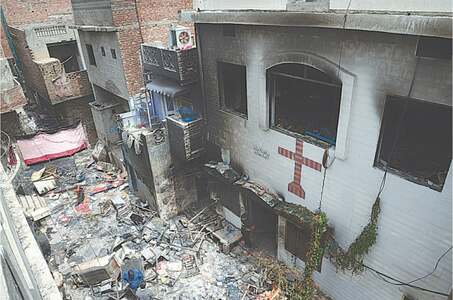“Agar ye khita mazhab ke naam par taqseem hua to nafrat ki iss aag ko bhujate bhujate aanay wali naslon ki kamar toot jaegi.” (If this land is divided in the name of faith, a tidal wave of hate so enormous will erupt that generations will be engulfed by it.) — Bhagat Singh
WHAT can one say that hasn’t already been said? Punjabi Christians have suffered so many horrors in the land of the pure that one has lost count. Mere condemnations of Wednesday’s mob violence in Jaranwala are insufficient, the ones issued by officialdom past and present downright pathetic. More galling is the belated urgency with which the state apparatus apprehended hundreds of ‘culprits’ and promised to provide ‘security’ to those still at risk. Everyone who has seen the visuals can testify that law enforcement stood idle and watched as the violence played out.
It could have happened anywhere and it would be no less disturbing. But for this to happen in Jaranwala is cruelly ironic. This is the same Jaranwala that was a hub of Indian nationalism in the early 20th century, the same Jaranwala that birthed Bhagat Singh. No reading of the subcontinent’s modern history — and that of British colonialism in particular — is complete without mentioning the crucial role played by the Sikh peasantry in western Punjab’s canal colonies. It was the Sikh peasantry that radicalised an entire generation of Punjabis in particular, and Indians more generally. They mobilised at home and in the diaspora, birthing organisations like the Ghadar Party and winning international support for the Indian freedom movement.
One can be critical of the methods of figures like Bhagat Singh, and the latter’s espousal of revolutionary violence especially so. But where Jinnah, Iqbal, Gandhi and Nehru are given pride of place in nationalist histories, Bhagat Singh, Subhas Chandra Bose and many others deserve more than a footnote.
The spread of hateful, right-wing politics will ultimately engulf us all.
Jaranwala is a tragedy first and foremost for the many Christian women, children and men who lived through the terror of hateful lynch mobs attacking their places of worship; many saved themselves by hiding in bushes and farmlands. But seen through a historical lens, the tragedy has been borne out by hundreds of millions across the subcontinent for 76 years.
Jaranwala was home to Sikhs, Hindus, Muslims, Christians, etc, for decades. Even after partition and the outflux of Sikh and Hindu populations, Jaranwala remained a hub of leftist peasant organisers, boasting a largely secular societal consciousness. Church burnings would have been unthinkable.
We know what the Zia era represented and how it sowed the seeds of hate that have wreaked havoc in Pakistan’s diverse ethnic-national heartlands. But 40 years is a long time, and the question is: when will we hold to account master strategists that continue to patronise religious militant groups like the TTP, TLP and many more?
The state’s refusal to budge from an insular official narrative equating nationhood with religion is the root cause of the misery faced by Christians and many more communities cast outside the pale of Sunni Islam. But the rot does not stop here. Narendra Modi has been in power for almost a decade and has eroded the relatively secular foundations of the Indian polity in ways that seemed unimaginable a generation ago. The scenes witnessed in Jaranwala are now an almost everyday occurrence in India, particularly although not exclusively against Muslims.
I am not trying to undertake an exercise in false equivalence. I wish only to note that the spread of hateful, right-wing politics will ultimately swallow us all up until and unless our youthful populations are mobilised around political principles that motivated historical figures like Bhagat Singh.
This is the crux of the matter. The median age of Pakistan’s 240 million people is 23. While the instigators of incidents like Jaranwala — both the clerics who incite and lead the mob and the spymasters who sit in smoky rooms designing the next hate project — are often much older, the foot soldiers are all youth. In a society which offers very little hope for a dignified and prosperous life, it is working class and lumpen young people who are most easily drawn towards hate.
It is also worth bearing in mind that most of the Christians affected by the violence in Jaranwala hail from working-class backgrounds, many of them sanitary workers and other menial-wage labourers. In our cities, a majority of Christians live in katchi abadis. To genuinely stand with Punjabi Christians is to engage with class politics. This is what individuals like Bhagat Sindh would have done and it is only in finding such common ground that a genuinely transformative vision can gain mass roots and defeat the politics of hate.
The writer teaches at Quaid-i-Azam University, Islamabad.
Published in Dawn, August 18th, 2023




































